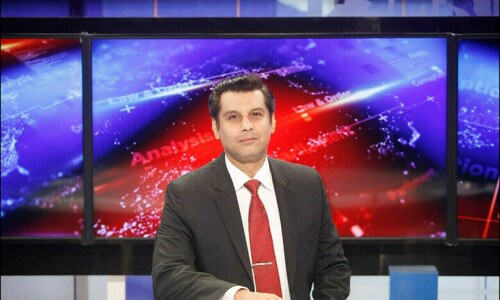REFUTING news reports carried by the sections of Pakistani media in recent days claiming that journalist Arshad Sharif was tortured for two to three hours and then killed, a Kenyan newspaper cited an expert who analysed post-mortem examination findings and discredited this account of Mr Sharif’s death.
“The reporting by sections of Pakistan media sought to cast doubt on the official account by Kenyan authorities that the prominent journalist was shot dead [last month in Kenya] by police at a roadblock in a case of mistaken identity,” Kenya’s Nation newspaper said in a report published on Friday.
The “torture before death” account first came to the fore when a Pakistani journalist gave what he described as “shocking details of the cold-blooded” killing of Arshad Sharif. That journalist claimed that Mr Sharif was “brutally tortured for over three hours and his nails were pulled from fingers before being martyred, while his fingers and ribs were also broken due to severe torture”.
Describing the death as a premeditated assassination, he said that “the shots were fired from a close range on the back of [Mr Sharif’s] head”.
When the Nation reached out to Dr Ahmed Kalebi, an independent consultant pathologist based in Nairobi who analysed the two post-mortem examination reports to explain the cause of death, he pointed out that the probable time that lapsed between injury and death “was between 10 and 30 minutes”, the Kenyan newspaper reported.
“Whereas the report doesn’t elaborate on the reasoning behind the time interval from injury to death, it appears that this estimation was made on the basis of the injuries seen in the brain and the right lung rather than any particular histopathological examination or further scientific examination analysis,” Dr Kalebi explained.
The pathologist explained from the reports of autopsies done in Kenya and Pakistan, there is no evidence of torture. “The report has not documented any evidence of other injuries that would be consistent with torture, nor does it indicate that the deceased was tortured before death,” he said.
In Kenya, Chief Pathologist Dr Johansen Oduor conducted Arshad Sharif’s post-mortem examination. In Pakistan, an eight-member team led by Prof S.H. Waqar of the Pakistan Institute of Medical Sciences conducted the autopsy, the news report said.
What autopsy report says
Brian Obuya, an investigative reporter at the Nation Media Group, posted the post-mortem report on Twitter, saying that its findings were “an exact match with what eight doctors in Pakistan found. As we pursue justice for the late Sharif, let’s beware of propaganda, sensation and its beneficiaries”.
According to the autopsy report, Mr Sharif had a “graze gunshot wound” on the left parietal area of the scalp. The parietal region is in the upper portion of the brain, above the ear. Some part of his skull was also missing, the report said. Besides, another shot entered the body from the upper back side and exited the chest. The report also mentioned damage to the lungs and hemothorax.
Mr Sharif died of multiple gunshot wounds to the head and chest, it said, adding that the shots came from high-velocity firearms from an intermediate range.
A part of Mr Sharif’s liver and blood from his femoral vein — a large blood vessel in the thigh — was drawn to find out if he was poisoned, while his nails were removed for DNA, among other things.
Published in Dawn, November 14th, 2022













































